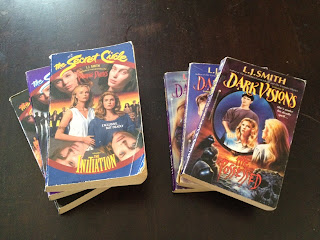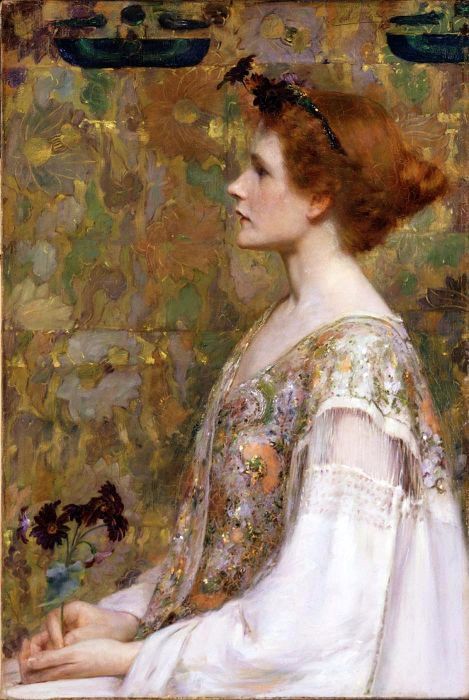So for the past couple of months, I've spent a lot of time holed up in my apartment due to some epic hip pain. I have bursitis in my hips. That's right, bursitis. And, yes, this does mean that I'm an 80-year-old trapped in a 28-year-old's body: I also spend a lot of time cat cuddling and tea drinking and thrift shopping and grouching at the noisy youngsters who walk past my bedroom window and staying in to quietly listen to NPR. I'm cool with it. ;)
Anyway, my bad flare up has had one good consequence: I've had the chance to spend a lot of time sitting on my couch, icing my hips, and watching The Vampire Diaries. Created by The CW, The Vampire Diaries is one of those shows that shouldn't be good but is. It's a vampire show written for teenagers, but don't think Twilight--think True Blood with more high school and less nudity.
 |
| The Vampire Diaries |
The Vampire Diaries follows a 17-year-old girl named Elena who just happens to have two really fantastic looking vampire brothers fall in love with her. She spends a lot of time tenderly embracing one of them (Stefan) and kind of flirting with the other one (Damon) and fending off other mean old vampires who just happen to not be in love with her. And, of course, there are some witches and werewolves hanging about and a lot of relationship drama and witty repartee. Add in a whole lot of painfully good looking people and a dash of gratuitous violence and it makes for a heady, addictive mix. It's not quite as clever as Buffy the Vampire Slayer, but The Vampire Diaries has more plot twists than a spy novel and surprisingly complex characters who actually manage to grow from episode to episode (which is more than a lot of TV series can claim).
But after the first few episodes, I kept thinking, "Hmmmm, the names Damon and Stefan sure sound familiar." That's when I realized that the show was based on The Vampire Diaries novels written by L. J. Smith which I had owned and read when I was all of 13! I remembered not being a big fan of the series (I'm pretty sure that I sold them at a garage sale when I was in high school), but I adored (and--I will admit it--still own) her other four series: The Secret Circle, Dark Visions, The Forbidden Game, and Night World. I read and re-read those books, like, a lot. And I'm secure enough in my intellectual and literary tastes to admit it. ;)
 |
| The Secret Circle and Dark Visions. (Oh, yes, I did find these on one of my bookshelves!) |
All of these books involve witches, vampires, werewolves, psychics, or some combination of these supernatural types, and they're all very romantic and soul mate-y and "tragic" and probably horribly obnoxious, but I loved them all. I doubt that they would hold up to being reread by my adult brain, but I can't regret those hours I spent as a lonesome, awkward, angry, dreamy junior high student, laying in my bed re-reading those novels, wishing that something, anything, exciting would happen to me. (Heck, I wouldn't have minded a bite-y vampire boyfriend, so long as I had one!) Those books were just right for me when I read them, no matter how horrifying I would find them now, with their lovely, thoughtless heroines and their menacing, controlling supernatural boyfriends.
 |
| The newest The Vampire Diaries edition. |
But, of course, I had to at least try to reread The Vampire Diaries novels to see how closely they followed the show, and this proved to be one of those rare occasions where the screen version of something vastly improves upon the original text.
The writers and producers at The CW have (thankfully) taken a lot of liberties with the novels. The books are abjectly awful; I made it through the first one only by reading every fourth word and flipping a few pages ahead whenever I was annoyed or horrified or confused by a character, a plot point, or an adjective (this happened a lot). The main character was awful, the writing was insipid (yes, tell me more about how Elena's furniture was Victorian cherry wood and she wore a peach colored silk ribbon in her hair, because that is both realistic and vitally important to my understanding of her character!), and the plot was mainly about how making out with vampires is not just fun--it's fulfilling! I mean, these books make Twilight read like Hemingway, all precision and restraint and deep, deep feeling.
 |
| When will I ever learn not to read books whose cover blurbs start with "A DEADLY LOVE TRIANGLE"?! |
But I would still highly recommend the show, no matter how sordid its origins. It does a great job of yanking out the best parts of the original novel's story-line and trashing the rest: Elena's personality is (thank goodness) drastically different, she's given a little brother and a slew of friends with compelling story-lines of their own, and the tumultuous relationship between the two vampire brothers is probably the most complicated and meaningful relationship in the show. Instead of being about vampires or (*shudder*) soul-mates, The Vampire Diaries manages to be about the strength of family bonds, self-transformation and redemption, and accepting one's past.
And let's be honest: who would ever turn down two really pretty vampire boyfriends for the price of one?
 |
| (Don't forget to wipe the drool off your keyboard before you go, ladies!) |















